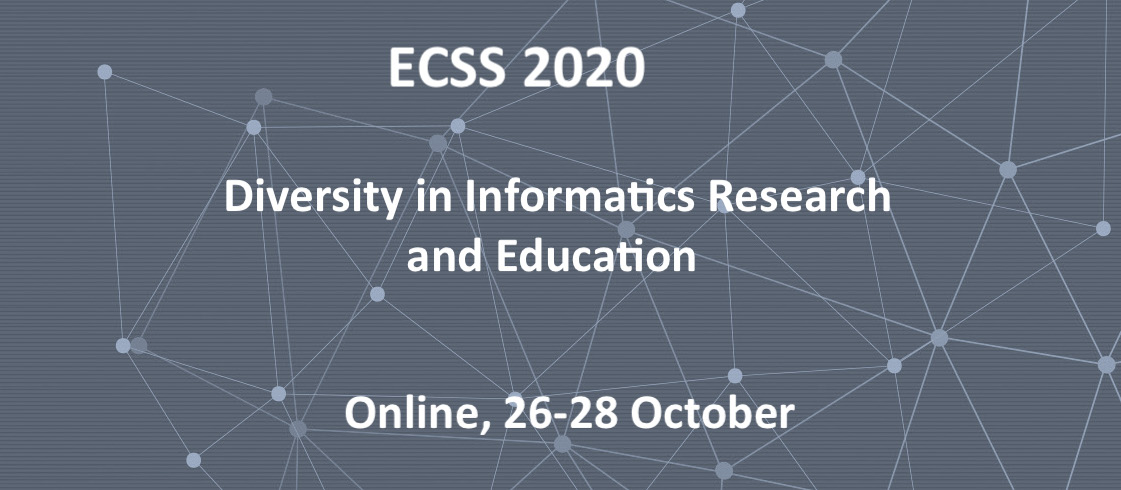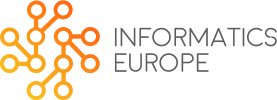Deans, department heads, research directors, senior and junior academics, industry and public policymakers from all over Europe met online via Zoom, 26-28 October, for the 16th edition of the European Computer Science Summit, ECSS 2020.
See the conference highlights and photos.
Download the slides and see video recordings of the various talks on the ECSS 2020 program page.

Quick Links:
- Conference Program
- Leaders Workshop
- WIRE Working Group Workshop
- National Associations Workshop
- Keynote speakers and talks summaries
ECSS 2020 is the 16th Summit of Informatics Europe. It is the only place, once a year, where leaders and decision-makers in Informatics research and education in Europe gather to debate strategic themes and trends related to research, education, and policies in Informatics. It is a unique opportunity to meet leaders in the field and discuss critical issues of the discipline related to education, research, funding, entrepreneurship, management, career development, and policies.
For the first time in its sixteen years of history, ECSS was held as an online event, 26-28 October 2020, the result of the Covid-19 health crisis that affected the whole continent and changed our way of living, working, networking, and socializing. The main theme was "Diversity in Informatics Research and Education". Prominent speakers from all over Europe provided their perspectives and fuelled discussions on questions such as 'Does Informatics as a field benefit from interdisciplinary collaboration?', 'In which interdisciplinary areas does Informatics have the biggest (potential for) impact?', 'How should interdisciplinary research and teaching (including doctoral education) be organised?', and 'How diversity (gender and other dimensions) can help to strengthen Informatics departments?' Following keynote speakers shared their expert views and insights at ECSS 2020.
- Isidro Laso Ballesteros, Cabinet of the European Commissioner for Innovation, Research, Culture, Education and Youth, Mariya Gabriel
- Ewan Birney, European Molecular Biology Laboratory (EMBL), European Bioinformatics Institute
- Georgi Dimitrov, European Commission, Directorate General for Education and Culture
- Paola Inverardi, University of L'Aquila
- Vivian Anette Lagesen, Norwegian University of Science and Technology (NTNU)
- Arosha K. Bandara, The Open University
- Bashar Nuseibeh, The Open University & Lero, University of Limerick
- Martin Zachariasen, IT University of Copenhagen
Conference Chair:
- Enrico Nardelli, Informatics Europe, University of Rome "Tor Vergata"
Chairs of the Diversity in Informatics Research and Education Sessions:
- Jaak Vilo, University of Tartu
- Letizia Jaccheri, Norwegian University of Science and Technology (NTNU)
Informatics Education Session
The conference opened on 26 October with a special session on Informatics Education. The session was opened with an insightful speech by the Cabinet of the European Commissioner for Innovation, Research, Culture, Education and Youth, Mariya Gabriel, who was represented by Isidro Laso Ballesteros. The opening session was rounded up with three excellent talks on Informatics Education by Wendy Hall, Chair of the Informatics for All Steering Committee, Georgi Dimitrov, project leader for the update of the European Commission Digital Education Action Plan, and Martin Zachariasen, Rector of the IT University of Copenhagen.
Leaders Workshop
The 2020 Workshop for Leaders of Informatics Research and Education was held on 26 October, co-chaired by Mehdi Jazayeri, Università della Svizzera italiana, and Harald Gall, University of Zurich. The central theme was 'Post-Pandemic Ways for Learning and Researching in Informatics', with focus on exploring the impact of the coronavirus pandemic on Informatics academic departments across Europe.
WIRE Working Group Workshop
Why and how to improve gender balance at all stages of the career path in Informatics (Computer Science, Computing, IT, ITC) was the theme of the 2020 WIRE Workshop held on 28 October and co-chaired by Erika Ábrahám, RWTH Aachen University, and Letizia Jaccheri, Norwegian University of Science and Technology (NTNU) with contribution of the members of the Women in Informatics Research and Education Working Group. The event joined together Academia, Industry and Policy (European Commission) for a fruitful debate on how these sectors can work together to inspire and promote change that can impact the access of women to higher education and their ability and prospects of leading successful and fulfilling careers in Informatics in Academia, Industry or other sectors.
National Associations Workshop
The Workshop of National Informatics Associations was held on 28 October, chaired by Pekka Orponen, Aalto University, and Kim Mens, Université catholique de Louvain, and dedicated to the theme ‘Interdisciplinarity and Informatics’. The workshop covered questions in four dimensions: research, education, large-scale trends, and societal aspects and aimed at sharing experiences as well as best practices and discussing common concerns and opportunities in the area.
Audience
The ECSS audience includes anyone with a stake in the future of Information and Communication Science and Technology in Europe. Traditionally, many department heads, directors of both industrial and academic labs, and other decision-makers make up a substantial share of ECSS participants. However, the scope of the conference is much broader and professionals from all levels and all sectors (academia, industry, government) would benefit from the discussions and critical debate on the future of the discipline.
Purpose of the European Computer Science Summit:
- Debate the future of the discipline, its role, and influence in both academy and society.
- Expand the international network of deans, heads of departments, and research directors in Informatics.
- Provide a forum for discussion and the exchange of solutions and best practices on common issues.
- Examine ways in which deans, department heads, and research directors in Informatics can work together to improve teaching and research, implement the Bologna process, can influence the policies of their universities, governments and the EU, and take joint initiatives on many other issues.
- Provide opportunities for liaisons with other groups pursuing relevant interests.
ECSS 2020 is organised by
 |

 Netlogica
Netlogica